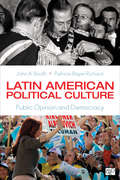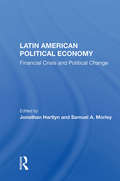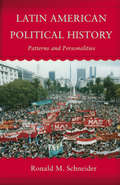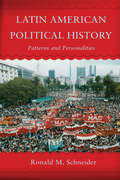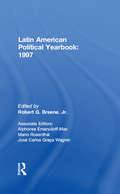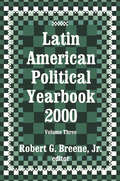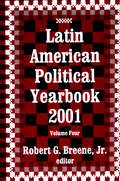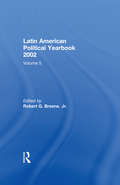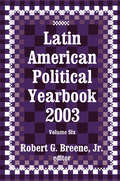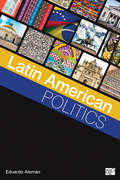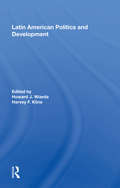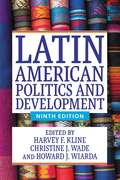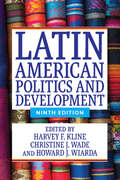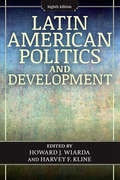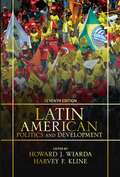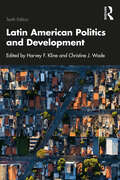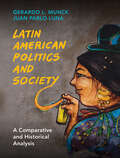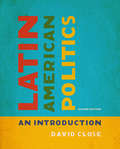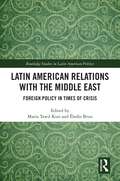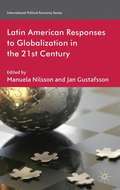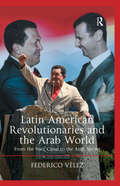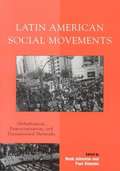- Table View
- List View
Latin American Political Culture: Public Opinion and Democracy
by John A. Booth Patricia RichardLatin American Political Culture: Public Opinion and Democracy presents a genuinely pan-Latin American examination of the region’s contemporary political culture. This is the only book to extensively investigate the attitudes and behaviors of Latin Americans based on the Latin American Public Opinion Project’s (LAPOP) AmericasBarometer surveys. The findings reveal a complex Latin America with distinct political culture. Authors John Booth and Patricia Bayer Richard join rigorous analysis with clear graphic presentation and extensive examples, and readers learn about public opinion research, engage with further questions for analysis, and have access to data, an expansive bibliography, and links to appendices.
Latin American Political Economy: Financial Crisis And Political Change
by Jonathan HartlynThis book considers the historical and contemporary determinants of the financial crisis facing Latin America from a political economy perspective and compares the effects of and responses to the crisis in a number of countries. It discusses the internal policy errors that led to financial blow-ups.
Latin American Political History
by Ronald M. SchneiderThis chronologically organized new text provides comprehensive historical coverage of Latin America's politics and development from colonial times to the twenty-first century.
Latin American Political History: Patterns and Personalities
by Ronald M. SchneiderThis chronologically organized new text provides comprehensive historical coverage of Latin America's politics and development from colonial times to the twenty-first century.
Latin American Political Yearbook: 1997
by Robert G. Breene Jr."Latin America constitutes a region well-endowed with sovereign nations, cultural differences, and varying states of development and political stability. The end of the cold war and the decline of revolutionary movements and regimes has cast political perceptions of the region in a new light even as it has wrought momentous changes in the individual countries themselves. Latin American Political Yearbook: 1997 provides a comprehensive overview, analysis, and summary of the major political and economic trends and events in Mexico, Central and South America, and the Caribbean both for their significance within special countries, the entire region, and relations with the world at large.Elections and the status of political forces in Latin America are the focus of part 1. It provides an up-to-date, realistic definition of today's political ""Left"" and describes the political situations in the Central American, MERCOSUR, Andean, and Caribbean nations. Moreover, special consideration is given to the case of Nicaragua. In part 2 the politico-economic backgrounds of such representative Latin American nations as Argentina, Bolivia, Brazil, Ecuador, Honduras, Paraguay, and Venezuela are updated to demonstrate that corruption and collectivism have been responsible for most, if not all of the region's economic woes. The next two parts are concerned with the Hemispheric left (HL) and the Hemispheric Left Support, respectively, the former dealing with the loose association of Latin American Marxist and Marxist-Leninist organizations. It begins with an in-depth look at its enigmatic chief, Fidel Castro, and then discusses HL umbrella organizations; Colombian, Mexican, and Central American terrorist groups; HL narcoterrorism; and the special case of Peru. The book concludes with a look at Latin American international organizations Including trade and tariff associations, technical groupings, regional associations, and hemisphere-wide "
Latin American Political Yearbook: 2000
by Jr. DentonIn the third volume of this annual series, Robert G. Breene provides a comprehensive overview, analysis, and summary of the major political and economic trends and events in Central American, MERCOSUR, Andean and Caribbean nations, including Mexico. The yearbook provides a timely look at relevant background information necessary to an understanding of the status of political forces in Latin America today. Chapter 1 looks at the elections and status of political forces in Latin America and describes the political situations in the four groups of nations. It provides an up-to-date, realistic definition of today's political "Left." Chapter 2 relates the politico-economic backgrounds of such representative Latin American nations as Argentina, Bolivia, Brazil, Ecuador, Honduras, Mexico, and Panama, while chapter 3 explores in detail three hemispheric heads of state receiving much international attention: Pinochet, Ortega, and Clinton. Chapter 4 discusses the Hemispheric Left (HL), described as a loose association of amorphous Marxist and militant left organizations, and, as in previous editions of this yearbook, includes an overview of all hemispheric terrorism. The year 1998 witnessed an increased, overshadowing level of terrorism in Colombia necessitating separate coverage of Colombian terrorism, which is treated in chapter 5. The final two chapters are concerned with the Hemispheric Left Support, dealing with the association of Latin American Marxist and Marxist-Leninist organizations, and providing a look at Latin American international organizations, including regional summits and hemisphere-wide associations such as the Grupo de Rio and the Organization of American States. This third volume is brimming with facts and provides information not readily available through American media. Compact yet comprehensive, it is essential reading for political scientists, Latin American area specialists, and historians. Robert G. Breene, Jr. has been a fighter pilot, a newspaper correspondent in Central America, a professor of physics, and the owner and operator of a 600-head cattle ranch in Nevada. His is currently head of the Latin American Syndicate in San Antonio, Texas.
Latin American Political Yearbook: 2001
by Jr. DentonIn the fourth volume of this annual series, Robert G. Breene provides a comprehensive overview, analysis, and summary of the major political and economic trends and events in Central America, MERCOSUR, Andean and Caribbean nations, and Mexico. Analyzing these developments within the individual nations, their respective regions, and the world at large, the yearbook offers a timely look at the relevant background and information necessary to understand the changing nature of politics in Latin America today.The volume's opening two chapters continue the coverage of the earlier volumes, presenting details of various Latin American elections with relevant background information. The remaining five chapters cover various aspects of the development of regional history during the year 2001. Chapter 3 on U.S. diplomacy examines the immediate impact of President Clinton's various Latin American trips and initiatives. The Hemispheric Left and support for the Hemispheric Left are treated in general terms in chapter 4, while the next three chapters examine specific nations, Colombia (chapter 5), Venezuela (chapter 6), and Cuba (chapter 7) where these forces were of particular importance during the year.The material presented on Cuba is of particular interest considering the September 11, 2001 outrage; although, as the editor notes, it remains to be seen if the measures adopted at Guantanamo did keep Castro from dabbling in the aftermath. The final chapter continues the series' discussion of Latin American international organizations such as the Grupo de Rio and the Organization of American States. The continuity of the information presented in these volumes is one of their valuable assets as is the examination of the Disinformation Operation (DO) of the Hemispheric Left. Disinformation examples are many, ranging from the Harbury DO in Guatemala through Ruz Castro's Foro Soo Paolo and the totally misrepresented Zapatista National Liberation Army to the Great Gringo DO continues to operate with impunity.This is a reference volume with a point of view. It is brimming with facts and provides information not readily available through the American media. Compact, yet comprehensive, it is essential reading for political scientists, Latin American area specialists, and historians.
Latin American Political Yearbook: 2002
by Robert G. Breene Jr.In the fifth volume of this annual series, Robert G. Breene provides a comprehensive overview, analysis, and summary of the main political and economic trends and events in various portions of Latin America. Analyzing these developments within individual nations, their respective regions, and the world at large, the yearbook offers a timely look at the relevant background and information necessary to understand the changing nature of politics in Latin America today.A new and threatening development, the nexus of organized international Marxist-Leninist activity and Islamic terrorism, is treated at length throughout much of the volume. In the foreword, the editor notes how the rise of international terrorism associated with radical Muslim thought has formed a nexus with the resurgence of the Hemispheric Left, thus calling into question whether the international left has really been transformed into free-enterprise democrats, as many have simplistically argued. The volume discusses the roots of a left-Muslim connection in the close association between the Sandinistas in Nicaragua and the Qaddafi regime in Libya as well as the training provided by Arab terrorists to their Latin American allies. For larger, more powerful states, the picture is more ambiguous. While the present-day ideological attitudes of former Marxist states and political entities cannot be known with absolute certainty, the materials assembled here cast doubt on the validity of hopeful assumptions of democratic political behavior in the conduct of foreign affairs. One example is an important treaty between post-Soviet Russia and China. The volume also documents the rise in Castro's fortunes with the strengthening of leftist power in Venezuela and Mexico, and the neutralization of Brazil through Castro's long-standing support for the presidency of the Marxist Lula da Silva.This is a reference volume with a point of view. Compact yet comprehensive, it is essential reading for political scientists, Latin America area specialists, and historians.Robert G. Breene, Jr. has been a fighter pilot, an experimental test pilot, a newspaper correspondent in Central America, a professor of physics, and the owner and operator of a 600-head cattle ranch in Nevada. He is currently head of the Latin American News Service in San Antonio, Texas, from which much of this analysis was derived.
Latin American Political Yearbook: 2003
by Jr. BreeneIn the sixth volume of this annual series, Robert G. Breene provides a comprehensive overview, analysis, and summary of the political and economic trends and events in Central America, MERCOSUR, the Andean and Caribbean nations, and Mexico. Analyzing these developments within the individual nations, their respective regions, and the world at large, this yearbook offers a timely look at the relevant background and information necessary to understand the changing nature of politics in Latin America today.A significant development has been the growing nexus of Marxist-Leninist and Muslim terrorism. Before the turn of the new century, portents of this development were discernable in the long terrorist war conducted against the democratic West by those followers of Lenin, Stalin, and their successors. This has now been transformed into a "crusade" against non-Muslim societies. The materials included here attest to the fact that the hemispheric left and Cuba were involved in terror long before it suddenly materialized in the United States. As this volume records, Castro was in Teheran in May 2001 where he pledged that "the peoples and governments of Iran and Cuba can bring the U.S. to its knees." Four months later, terrorists of the Al-Qaeda network destroyed the World Trade Center and struck the Pentagon. In replying to this outrage, the Bush administration identified an Axis of Evil, which did not include either the Cuban or Chinese Communist regimes, two original seats of international terror. As this volume demonstrates, however, whether neatly includable in the "axis" or otherwise, Castro and his political allies u Hugo Rafael Chbvez Fryas of Venezuela, Lula da Silva of Brazil, and others u are closely associated with at least one avowed member state of the Axis.In addition to its analysis of these and other new developments, the Yearbook continues its invaluable coverage of election results throughout Latin America. Brimming with information not readily available through the American media, this series is essential reading for political scientists, journalists, Latin America area specialists, and historians.Robert G. Breene, Jr. has been a fighter pilot, a newspaper correspondent in Central America, a professor of physics, and the owner and operator of a 600-head cattle ranch in Nevada. He is currently head of the Latin American News Syndicate in San Antonio, Texas.
Latin American Politics
by Eduardo AlemanWhile it is true that poverty, political instability, and economic under-performance continue to be major problems in Latin America, the region has made substantial progress in raising standards of living and overcoming military authoritarianism. Latin American Politics reflects just how much the region has changed in the last two decades. Eduardo Alemán draws on contemporary research in comparative studies on institutions, elections, and public opinion to highlight the big questions that political scientists seek to answer today: What are the causes of political instability? What factors have influenced changes in economic and gender inequality? What are the implications of different political institutions for political outcomes?
Latin American Politics
by Eduardo AlemanWhile it is true that poverty, political instability, and economic under-performance continue to be major problems in Latin America, the region has made substantial progress in raising standards of living and overcoming military authoritarianism. Latin American Politics reflects just how much the region has changed in the last two decades. Eduardo Alemán draws on contemporary research in comparative studies on institutions, elections, and public opinion to highlight the big questions that political scientists seek to answer today: What are the causes of political instability? What factors have influenced changes in economic and gender inequality? What are the implications of different political institutions for political outcomes?
Latin American Politics And Development, Fifth Edition
by Howard J. Wiarda Harvey F. KlineThis book offers a region-wide overview of the patterns and processes of Latin American history, politics, society, and development. It provides a detailed country-by-country treatment and unique features of all Latin American countries.
Latin American Politics and Development
by Christine J. Wade Howard J. Wiarda Harvey F. KlineFor over thirty years, Latin American Politics and Development has kept instructors and students abreast of current affairs and changes in Latin America. Now in its ninth edition, this definitive text has been updated throughout and features contributions from experts in the field, including twenty new and revised chapters on Mexico, Central America, the Caribbean, and South America. The fully updated foundational section includes new chapters on political economy and U.S.-Latin American relations and covers the changing context of Latin American politics, the pattern of historical development, political culture, interest groups and political parties, government machinery, the role of the state and public policy, and the struggle for democracy. In addition to detailed country-by-country chapters, Latin American Politics and Development provides a comprehensive regional overview.
Latin American Politics and Development
by Christine J. Wade Howard J. Wiarda Harvey F. KlineFor over thirty years, Latin American Politics and Development has kept instructors and students abreast of current affairsand changes in Latin America. Now in its ninth edition, this definitive text has been updated throughout and features contributions from experts in the field, including twenty new and revised chapters on Mexico, Central America,the Caribbean, and South America.
Latin American Politics and Development
by Harvey F. Kline Edited by Howard J. WiardaFor over thirty years Latin American Politics and Development has kept instructors and students abreast of current affairs in Latin America. Now in its eighth edition, this definitive text has been updated throughout and features contributions from experts in the field, including twenty entirely new chapters on Central America, the Caribbean, and South America. New material addresses Venezuela after the death of Hugo Chávez, Mexico and the continuing drug war, Cuba as Raúl Castro changes the revolution of his brother Fidel, and important changes with new presidents in Colombia, Uruguay, and Chile. In addition to detailed country-by-country chapters, Latin American Politics and Development provides a comprehensive regional overview. Five foundational chapters by the editors cover the changing context of Latin American politics, the pattern of historical development, interest groups and political parties, government machinery, the role of the state and public policy, and the struggle for democracy.
Latin American Politics and Development
by Editors Howard J. Wiarda Harvey F. KlineWith comprehensive chapters by recognized experts, this classic bookOConow updated throughoutOCoprovides an authoritative yet accessible introduction to Latin American government and political development. "
Latin American Politics and Development
by Kline and, Harvey F.For over forty years, Latin American Politics and Development has kept instructors and students abreast of current affairs and changes in Latin America. Now in its tenth edition, this authoritative yet accessible introduction has been updated throughout. Organized on a country-by-country basis, Latin American Politics and Development offers instructors maximum flexibility in organizing courses. Revisions to the Tenth Edition include: An updated theoretical framework to explain changes in the region, including discussions of electoral systems and political actors. Discussions on presidential, parliamentary, and municipal election cycles throughout the region from 2017 through early 2022. Coverage of the COVID-19 pandemic. Examination on the regional decline in democratic norms and practices. A look at the impact of the Trump administration on regional relations, including the decline in democracy. Updates on race, Indigenous groups, women, Afro-Latin Americans, contemporary social movements, religious and other non-elite groups.
Latin American Politics and Development, 7th ed.
by Howard J. Wiarda Harvey F. KlineFor thirty years Latin American Politics and Development has kept instructors and students abreast of current affairs in Latin America. Now in its seventh edition, this definitive text has been updated throughout and features contributions from experts in the field, including three entirely new chapters on Bolivia, Ecuador, and Mexico. Other new material addresses the economic crisis in Argentina; Brazil's continued economic and political progress; Chile's successful--if still tentative--combination of democracy, economic growth, and social equity; the continued challenge to Colombia's political system posed by guerillas, drug traffickers, and paramilitaries; Venezuela's continued flight from liberal democracy under Hugo Chavez; and Mexico's ongoing "civil war" as criminal organizations fight each other and the Mexican state to run drug trafficking and other criminal operations. In addition to detailed country-by-country chapters, Latin American Politics and Development provides a comprehensive regional overview. Five foundational chapters by the editors cover the context of Latin American politics, the pattern of historical development, interest groups and political parties, government machinery, the role of the state and public policy, and the struggle for democracy.
Latin American Politics and Development, 8th ed.
by Howard J. Wiarda Harvey F. KlineFor over thirty years Latin American Politics and Development has kept instructors and students abreast of current affairs in Latin America. Now in its eighth edition, this definitive text has been updated throughout and features contributions from experts in the field, including twenty entirely new chapters on Central America, the Caribbean, and South America. New material addresses Venezuela after the death of Hugo Chávez, Mexico and the continuing drug war, Cuba as Raúl Castro changes the revolution of his brother Fidel, and important changes with new presidents in Colombia, Uruguay, and Chile. In addition to detailed country-by-country chapters, Latin American Politics and Development provides a comprehensive regional overview. Five foundational chapters by the editors cover the changing context of Latin American politics, the pattern of historical development, interest groups and political parties, government machinery, the role of the state and public policy, and the struggle for democracy.
Latin American Politics and Society: A Comparative and Historical Analysis
by Gerardo L. Munck Juan Pablo LunaTaking a fresh thematic approach to politics and society in Latin America, this introductory textbook analyzes the region's past and present in an accessible and engaging style well-suited to undergraduate students. The book provides historical insights into modern states and critical issues they are facing, with insightful analyses that are supported by empirical data, maps and timelines. Drawing upon cutting-edge research, the text considers critical topics relevant to all countries within the region such as the expansion of democracy and citizenship rights and responses to human rights abuses, corruption, and violence. Each richly illustrated chapter contains a compelling and cohesive narrative, followed by thought-provoking questions and further reading suggestions, making this text a vital resource for anyone encountering the complexities of Latin American politics for the first time in their studies.
Latin American Politics: An Introduction, Second Edition
by David CloseLatin American Politics, Second Edition is a thematic introduction to the political systems of all 20 Latin American countries. The approach is self-consciously comparative and encourages students to develop stronger comparative analysis skills through such topics as history, violence, democracy, and political economy. Fully updated and revised, this second edition also includes a new chapter on parties, elections, and movements. Each chapter is now framed by a prologue and an epilogue to engage students and provide more country-specific content.
Latin American Relations with the Middle East: Foreign Policy in Times of Crisis (Routledge Studies in Latin American Politics)
by Marta Tawil KuriLatin American Relations with the Middle East surveys the dealings of ten Latin American and Caribbean states – Argentina, Brazil, Chile, Colombia, Costa Rica, Cuba, Peru, Mexico, Uruguay, and Venezuela – with the Middle East. This volume examins these states' external behavior at both an empirical and conceptual level. Empirically, authors seek to examine Latin American and Caribbean foreign policies towards the Middle East in four dimensions: diplomatic attention; trade and investment (including the energy issue); development cooperation; security matters/intelligence, and relationship with multilateralism (Iran, Palestine, and Syria). Case studies are selectively deployed to observe the influence of unfavorable circumstances that have increased since 2015, such as domestic turmoil, wars, economic crisis, ideological bias, and international constraints. Conceptually, the book enhances the theoretical framework for understanding Southern countries’ foreign policies, through fomenting dialogue with Latin American and Caribbean regional literature on foreign policy. Authors inquire about how decision-making processes occur, and uncover how influential actors help to test the main hypotheses of Foreign Policy Analysis (FPA). Forging essential new paths of inquiry, this book is a must read for researchers of International Relations, Foreign Policy, South-South Relations, Latin American Politics and Middle Eastern Politics.
Latin American Responses to Globalization in the 21st Century
by Manuela Nilsson Jan GustafssonWritten by a diverse group of scholars and practitioners from Latin America, the US and Europe and taking into consideration the recent global financial crisis,the book offers a multifaceted insight into the expectations as well as the possible threats related to Latin America's incorporation into the sphere of global interconnectedness.
Latin American Revolutionaries and the Arab World: From the Suez Canal to the Arab Spring
by Federico VélezRecounting recent encounters between Latin American and Arab countries this unique volume explores how, despite both geographical and cultural distances, Latin American revolutionaries constructed an image of the Arab World as one sharing their own political views and interests. From the nationalization of the Suez Canal to Latin American perspectives on the Arab Spring Federico Vélez offers a fascinating historical and contemporary analysis on the behaviour of actors on the periphery of the international system. Contributing to debates regarding ideological and political autonomy the book provides a comprehensive historical account of relations between the countries of Latin America and the Middle East alongside new analysis on the ways marginalized states can sometimes build unlikely alliances in their attempts to challenge structures of power.
Latin American Social Movements
by Paul AlmeidaAs Johnston (social psychology and social change, San Diego State U.) and Almeida (sociology, Texas A&M U.) observe, Latin America has experienced an unprecedented wave of popular protest in the last decade, a phenomenon they argue is not fully explainable by reference to economic grievances and social claims. Their characterization of the new social movements find a fuller explanation in the intersection of three themes: neoliberal economic globalization and its effect on the articulation of claims, democratization and the opening of political opportunities for challenging groups, and networks of advocacy and support organized on a transnational scale. They present 13 case studies that explore these themes, individually and in combination, as they have manifested in Mexico, Argentina, Venezuela, El Salvador, Nicaragua, Brazil, and Guatemala. Annotation ©2006 Book News, Inc., Portland, OR (booknews.com)
